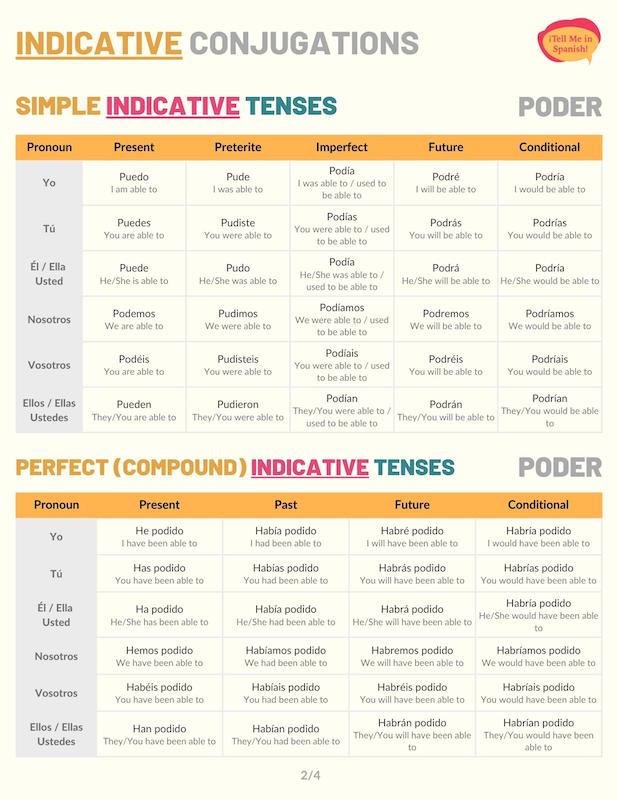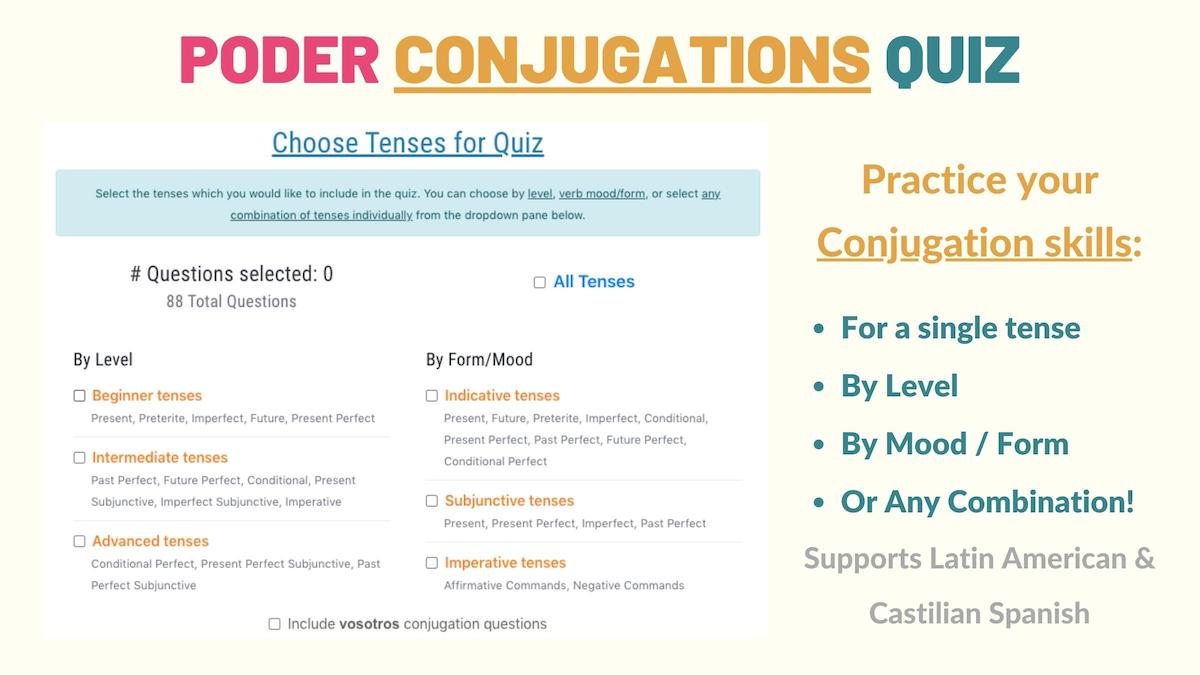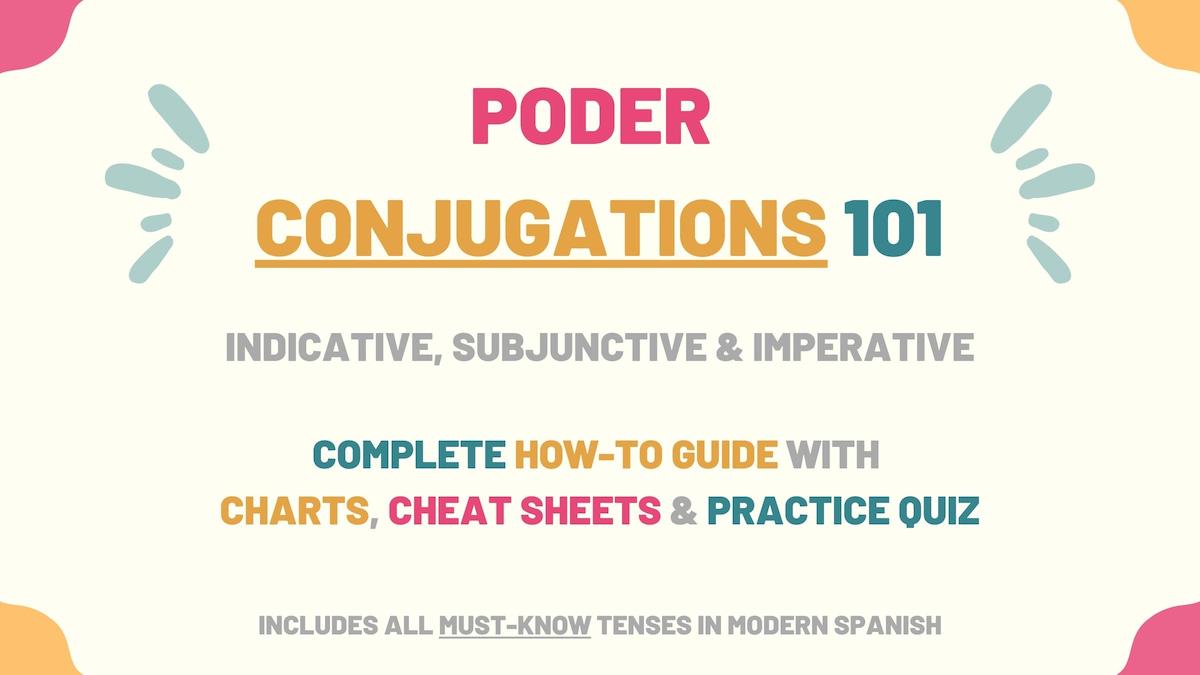In Spanish, poder is one of the most important and common irregular verbs you’ll use on a daily basis. Additionally, this verb can also help you practice O to UE stem changes. So, in this guide, we’ll review the poder conjugation charts. Here is a summary of what we’ll cover:
- Poder Overview
- Indicative Tenses of Poder Conjugations
- Subjunctive Tenses of Poder Conjugations
- Imperative (Commands) of Poder Conjugations
- Uses & Examples
- Download Poder Conjugation Tables & Uses Cheat sheets
- Poder Conjugation Practice Quiz
Overview of Poder
| Verb Characteristic | Property |
|---|---|
| Verb Type | -ER |
| Irregular | Yes |
| Infinitive | Poder |
| Gerund (Present Participle) Form | Pudiendo |
| Past Participle Form | Podido |
| Synonyms | Ser capaz. |
Irregularities:
- Preterite: pud for all subject pronouns.
- Future & Conditional: podr for all subject pronouns.
- Imperfect Subjunctive: pudie for all subject pronouns.
Stem Changes: O to UE
- Present Indicative: pued for all subject pronouns except ‘nosotros’ and ‘vosotros’.
- Present Subjunctive: pued for all subject pronouns except ‘nosotros’ and vosotros’.
Depending on the sentence, poder can be translated as ‘to be able to’ or ‘can’. You can learn more about how to use this verb in the Uses & Meanings section.
Indicative Conjugations of Poder
Present tense
The conjugations of poder in the present tense have an O to UE stem change for all pronouns except ‘nosotros’ and ‘vosotros’. You can check this in the conjugation chart below. We use poder present conjugations to express what people can and cannot do.
For example: Ella puede ayudarte.
| Person | Conjugation | Translation |
|---|---|---|
| Yo | Puedo | I’m able to |
| Tú | Puedes | You’re able to |
| Él / Ella Usted | Puede | He/She is able to You (formal) are able to |
| Nosotros | Podemos | We’re able to |
| Vosotros | Podéis | You’re able to |
| Ellos / Ellas Ustedes | Pueden | They are able to You (plural) are able to |
Preterite tense
Poder preterite conjugations are formed with the irregular stem pud. Notice that the forms ‘yo’, ‘él’, ‘ella’, and ‘usted’ omit the accent mark in the preterite endings. You can see these changes in the conjugation chart below.
Use the preterite tense to conjugate poder to express that a person was or wasn’t able to do something. For example: ¿Pudiste hablar con Lara?
| Person | Conjugation | Translation |
|---|---|---|
| Yo | Pude | I was able to |
| Tú | Pudiste | You were able to |
| Él / Ella Usted | Pudo | He/She was able to You (plural) were able to |
| Nosotros | Pudimos | We were able to |
| Vosotros | Pudisteis | You were able to |
| Ellos / Ellas Ustedes | Pudieron | They were able to You (formal) were able to |
Imperfect tense
In the imperfect indicative tense, poder is a regular verb. Use poder imperfect conjugations to talk about the things people were or weren’t able to do for an extended time in the past. You can also use these forms when it’s unclear when someone was able to do something.
For instance: Yo nunca podía jugar con mi hermano.
| Person | Conjugation | Translation |
|---|---|---|
| Yo | Podía | I was able to I used to be able to |
| Tú | Podías | You were able to You used to be able to |
| Él / Ella Usted | Podía | He/She was able to He/She used to be able to You (formal) were able to You (formal) used to be able to |
| Nosotros | Podíamos | We were able to We used to be able to |
| Vosotros | Podíais | You were able to You used to be able to |
| Ellos / Ellas Ustedes | Podían | They were able to They used to be able to You (plural) were able to You (plural) used to be able to |
Near future
The Spanish immediate or near future is formed with ir (present tense) + a + poder. These conjugations allow you to express that a person is going to be able to do something very soon in the future. For instance: ¿Vas a poder ir mañana?
| Person | Conjugation | Translation |
|---|---|---|
| Yo | Voy a poder | I’m going to be able to |
| Tú | Vas a poder | You’re going to be able to |
| Él / Ella Usted | Va a poder | He/She is going to be able to You (formal) are going to be able to |
| Nosotros | Vamos a poder | We’re going to be able to |
| Vosotros | Vais a poder | You’re going to be able to |
| Ellos / Ellas Ustedes | Van a poder | They’re going to be able to You (plural) are going to be able to |
Future simple tense
Poder future tense conjugations are irregular. To form this tense, you must use the stem podr. Conjugate poder to the future simple to talk about the activities people will be able to do at some moment in the future. Podremos ayudarla en unas semanas.
| Person | Conjugation | Translation |
|---|---|---|
| Yo | Podré | I will be able to |
| Tú | Podrás | You will be able to |
| Él / Ella Usted | Podrá | He/She will be able to You (formal) will be able to |
| Nosotros | Podremos | We will be able to |
| Vosotros | Podréis | You (formal) will be able to |
| Ellos / Ellas Ustedes | Podrán | They will be able to You (plural) will be able to |
Conditional tense
To conjugate poder to the conditional tense, you must use the irregular stem podr. The conditional conjugations of ‘poder’ allow you to talk about the things people would be able to do. You can also use these forms to ask things politely in Spanish.
For example: ¿Podrías decirme dónde están los baños?
| Person | Conjugation | Translation |
|---|---|---|
| Yo | Podría | I would be able to |
| Tú | Podrías | You would be able to |
| Él / Ella Usted | Podría | He/She would be able to You (formal) would be able to |
| Nosotros | Podríamos | We would be able to |
| Vosotros | Podríais | You would be able to |
| Ellos / Ellas Ustedes | Podrían | They would be able to You (plural) would be able to |
Present perfect tense
Haber in the present tense + podido (past participle) is the structure you need to follow to form the Spanish present perfect. You can use these conjugations to refer to the activities people have or haven’t been able to do. For instance: No hemos podido arreglar la computadora.
| Person | Conjugation | Translation |
|---|---|---|
| Yo | He podido | I have been able to |
| Tú | Has podido | You have been able to |
| Él / Ella Usted | Ha podido | He/She has been able to You (formal) have been able to |
| Nosotros | Hemos podido | We have been able to |
| Vosotros | Habéis podido | You have been able to |
| Ellos / Ellas Ustedes | Han podido | They have been able to You (plural) have been able to |
Past perfect
The Spanish past perfect indicative tense is formed with haber (imperfect form) + past participle form of ‘poder’. With this tense, poder communicates that someone had been able to do something before another past action. Pensé que ya habías podido abrir la puerta.
| Person | Conjugation | Translation |
|---|---|---|
| Yo | Había podido | I had been able to |
| Tú | Habías podido | You had been able to |
| Él / Ella Usted | Había podido | He/She had been able to You (formal) had been able to |
| Nosotros | Habíamos podido | We had been able to |
| Vosotros | Habíais podido | You had been able to |
| Ellos / Ellas Ustedes | Habían podido | They had been able to You (plural) had been able to |
Future perfect
The future perfect tense of poder is used to talk about the activities someone will be able to do by or before a certain moment in the future. These forms are also used to refer to the things people might have been able to do. No sé si Juan ya habrá podido hablar con Lucy.
| Person | Conjugation | Translation |
|---|---|---|
| Yo | Habré podido | I will have been able to |
| Tú | Habrás podido | You will have been able to |
| Él / Ella Usted | Habrá podido | He/She will have been able to You (formal) will have been able to |
| Nosotros | Habremos podido | We will have been able to |
| Vosotros | Habréis podido | You will have been able to |
| Ellos / Ellas Ustedes | Habrán podido | They will have been able to You (plural) will have been able to |
Conditional perfect
When conjugated to the Spanish conditional perfect tense, poder refers to the things people would have been able to do if a past circumstance had been met. These poder conjugations also allow you to hypothesize about what someone was able to do.
For example: No habría podido hacer esto sin ti.
| Person | Conjugation | Translation |
|---|---|---|
| Yo | Habría podido | I would have been able to |
| Tú | Habrías podido | You would have been able to |
| Él / Ella Usted | Habría podido | He/She would have been able to You (formal) would have been able to |
| Nosotros | Habríamos podido | We would have been able to |
| Vosotros | Habríais podido | You would have been able to |
| Ellos / Ellas Ustedes | Habrían podido | They would have been able to You (plural) would have been able to |
Progressive tenses
The Spanish progressive tenses are formed with estar conjugated + pudiendo (present participle). Use progressive tenses to express that someone is being able to do something at the moment of speaking. For example: Sara está pudiendo arreglar la tele.
| Progressive Tense | Formula | Translation Example |
|---|---|---|
| Present | Estar (present) + pudiendo | I am being able to |
| Preterite | Estar (preterite) + pudiendo | You were being able to |
| Imperfect | Estar (imperfect) + pudiendo | He was being able to |
| Future | Estar (future) + pudiendo | We will be able to |
| Conditional | Estar (conditional) + pudiendo | They would be able to |
Poder Subjunctive Conjugations
The subjunctive mood in Spanish is used to talk about wishes, requests, suggestions, expectations, doubts, or hypothetical situations. In the sections below, you’ll find poder conjugation charts for the most common subjunctive tenses.
Present subjunctive
Poder subjunctive conjugations have an O to UE stem change. However, this spelling change is not applied to ‘nosotros’ and ‘vosotros’. Conjugate poder to the Spanish present subjunctive to express uncertainty, to wish or request someone to be able to do something.
Here is a sentence example: La verdad, no creo que pueda ir.
| Person | Conjugation | Translation |
|---|---|---|
| Yo | Pueda | I’m able to |
| Tú | Puedas | You’re able to |
| Él / Ella Usted | Pueda | He/She is able to You (formal) are able to |
| Nosotros | Podamos | We’re able to |
| Vosotros | Podáis | You’re able to |
| Ellos / Ellas Ustedes | Puedan | They are able to You (plural) are able to |
Present perfect subjunctive
The Spanish present perfect subjunctive is formed with the structure haber (present subjunctive form) + past participle (podido, in this case). Use these subjunctive conjugations to wonder or wish that a person has already been able to do something.
For example: Ojalá hayas podido hablar con Sonia.
| Person | Conjugation | Translation |
|---|---|---|
| Yo | Haya podido | I have been able to |
| Tú | Hayas podido | You have been able to |
| Él / Ella Usted | Haya podido | He/She has been able to You (formal) have been able to |
| Nosotros | Hayamos podido | We have been able to |
| Vosotros | Hayáis podido | You have been able to |
| Ellos / Ellas Ustedes | Hayan podido | They have been able to You (plural) have been able to |
Imperfect subjunctive
In the Spanish imperfect subjunctive tense, poder is an irregular verb. Use the stem pudier or pudies to form this tense. We use imperfect subjunctive conjugations to convey past suggestions, requests, or wishes someone had about a person being able to do something.
For example: Esperaba que pudieras ayudarme.
The imperfect subjunctive uses two conjugation models depending on the type of Spanish you use:
Latin American Spanish version
| Person | Conjugation | Translation |
|---|---|---|
| Yo | Pudiera | I was able to |
| Tú | Pudieras | You were able to |
| Él / Ella Usted | Pudiera | He/She was able to You (formal) were able to |
| Nosotros | Pudiéramos | We were able to |
| Ellos / Ellas Ustedes | Pudieran | They were able to You (plural) were able to |
Note: Since vosotros is not used in Latin American Spanish, the poder conjugation for this pronoun has been omitted in the chart above.
Castilian Spanish version
| Person | Conjugation | Translation |
|---|---|---|
| Yo | Pudiese | I was able to |
| Tú | Pudieses | You were able to |
| Él / Ella Usted | Pudiese | He/She was able to You (formal) were able to |
| Nosotros | Pudiésemos | We were able to |
| Vosotros | Pudieseis | You were able to |
| Ellos / Ellas Ustedes | Pudiesen | They were able to You (plural) were able to |
Past perfect subjunctive
In the past perfect subjunctive, poder communicates that someone would have been able to do something as long as a past circumstance was met. These subjunctive conjugations can also express regret for something you had or hadn’t been able to do.
For example: Si hubiera podido, te hubiera acompañado.
| Person | Conjugation | Translation |
|---|---|---|
| Yo | Hubiera podido | I had been able to |
| Tú | Hubieras podido | You had been able to |
| Él / Ella Usted | Hubiera podido | He/She had been able to You (formal) had been able to |
| Nosotros | Hubiéramos podido | We had been able to |
| Vosotros | Hubierais podido | You had been able to |
| Ellos / Ellas Ustedes | Hubieran podido | They had been able to You (plural) had been able to |
Poder Imperative Conjugations
In Spanish, we use the imperative conjugations to command people to do or not do something. Since we cannot order people to be able to do something, poder does not have imperative conjugations.
Meanings of Poder & Examples
Now that you know how to conjugate poder in Spanish, here are some formulas and examples of how to use this verb correctly. Notice that poder is the direct translation of ‘to be able to’ or ‘can’.
1. Expressing what someone is able to do
[Poder conjugated] + [infinitive verb]
No pude abrir el archivo.
I couldn’t open the file.
Si nos hubieras dicho, hubiéramos podido ir contigo.
If you had told us, we could have gone with you.
Si nos hubieras dicho, hubiéramos podido ir contigo.
If you had told us, we would have been able to go with you.
Take Note: Examples #2 and 3 above are exactly the same in Spanish, but can be written differently in English. This depends on whether you use the translation ‘to be able to’ or the modal verb ‘can’. Notice that using one verb or the other would also affect how the second verb is translated (go vs gone).
2. Asking things politely
[Conditional forms of poder] + [infinitive verb]
Señorita, ¿podría traerme un vaso de agua?
Miss, could you bring me a glass of water?
Disculpe, ¿podrían decirme dónde está el museo?
Excuse me, could you guys tell me where the museum is?
Take Note: Since it refers to capabilities or abilities, poder must always work with an infinitive verb. Without the information provided by this second verb, poder couldn’t stand alone in a sentence unless such information was implicit.
Download Poder Conjugation Charts & Uses Cheat sheets

Poder is one of the most important verbs that you’ll use on a daily basis when speaking Spanish. It’s an irregular verb in various tenses and has stem changes in others, so it can take some time to become familiar with all its forms. I’ve created a PDF you can download containing all of the poder conjugation charts as well as its meanings, uses, and real-world example sentences.
Practice Quiz: Poder Conjugation

Now that you’ve learned how to conjugate poder in Spanish, you can drill yourself on its regular, irregular, and stem-changing forms by taking this poder conjugation practice quiz.



